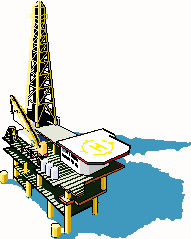Drilling for Inventions"Come 'n listen to my story 'bout a man named Jed . . ." No one knows exactly where or how deep to drill in the search for oil. There's no guarantee of hitting paydirt, yet exploration continues because the riches from one gusher make it worth the risk. However, smart prospectors don't invest more than they can afford to lose on any single well.
But the best experts can often only offer educated guesses. (Geologists joke that they sometimes throw darts at a map to decide where to drill.) Don't invest more than you can afford to lose because, like drilling for oil, inventing produces many "dry holes". Whether prospecting for profits from oil or from new ideas, the people who hold the purse strings make the final decisions. They move on when there's more money to be made with less risk no matter how much has been poured into a hole. They profit from failure by learning its lessons instead of getting discouraged. "Poor mountaineer barely kept his family fed . . ."When it's your money, be sure that enthusiasm is tempered by sober cost estimates and income projections. You need to understand the risks. Deciding when to move on is never easy. The "pot of gold" can seem so great that it's difficult not to spend just a little more. On some projects, it makes sense to keep trying even when the experts report that there is little hope for success. The benefits of solving a problem can be so great that it is worth gambling on nearly any crazy idea if the funds are available.
"An' then one day, he was shootin' at some food,
|
| You believe that there may be oil on a certain piece of land. You want
to claim the rights to the property because you are sure others will want
to lease it and pay you royalties from the oil they produce. Wouldn't it
be wise to learn something about the oil business before you try to negotiate
a lease?
First, you need to know how to prove oil exists on your property since others are not likely to take your word for it. You'll also need to understand how to prove you own the property and you must have the resources to defend your rights against others who claim they own it. If exploration companies are interested, you must know how to evaluate their qualifications. You don't want to lease your property to a company that doesn't have the right equipment to reach your oil. You also don't want someone who doesn't have the funds to finish the job, so you need to know about how much it should cost and how long it should take. What about the bidder's track record? You won't be able to tell if you're dealing with a good company unless you know what their batting average is and what it should be. |
Negotiating a good deal with a reputable company depends on how much you know about all of these topics. A patent is considered intellectual property. You need to learn how to manage and develop it just like you would with real property.
Turning an idea into a manufactured product can be very expensive and, the risks of failure are substantial. Whoever finances a project should be able to afford to lose that investment. If you can't, you need to develop a business plan and try to interest someone who can.

presents
An
Overview
of
Inventing
by
Ron O'Connor, P.E.
[< Prev]
[Up]
Preface
-Contents-
Introduction
Broker Scams
Real Help
Secrecy
Patents
Prototypes
Technical Help
Cost
Licensing
Financial Help
Real Life
What Next?
the
Author
 As
an inventor, you can learn valuable strategy from oil exploration: Spending
increases as drillers go deeper in their quest for oil just as your costs
will escalate as you drill deeper into an idea's potential. Oil companies
consult experts who interpret the results of seismic tests and soil studies
and then calculate the odds of success. Your idea will also need to be tested
many ways — both technically and commercially.
As
an inventor, you can learn valuable strategy from oil exploration: Spending
increases as drillers go deeper in their quest for oil just as your costs
will escalate as you drill deeper into an idea's potential. Oil companies
consult experts who interpret the results of seismic tests and soil studies
and then calculate the odds of success. Your idea will also need to be tested
many ways — both technically and commercially.